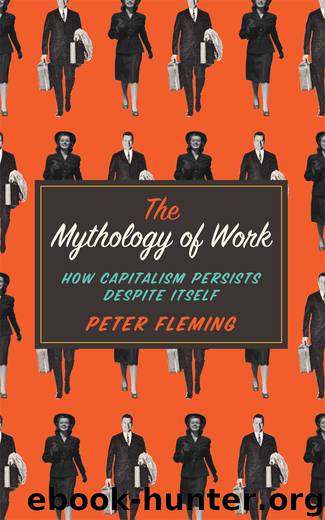The Mythology of Work by Peter Fleming

Author:Peter Fleming
Language: eng
Format: epub
Publisher: Pluto Press
Being Tagged: The ‘Open Prison’ of Work Today
The onset of our flu begins slowly. First a twinge in the back of the throat – is it only a head cold or something more serious? Then a temperature change – is that the start of a fever? Then a nauseating pressure that centres in the stomach and gradually moves to other regions of the body. Now the bones begin to ache; perhaps a little vomiting; the real thing arrives and we are bedridden. With a sense of euphoria that is difficult to beat, we can now call in sick. Time to do something fun, like watching a movie, perhaps reading that book we haven’t had the chance to pick up for months. Joyous rest. Meandering boredom. Unstructured time winding down to a civilized pace. Finally, life has begun again.
The line of argumentation I am developing here is not so much about illness per se, but about the underlying conditions of possibility that have made it a desirable experience today. What has changed in the way we work that makes the arrival of the flu feel like a reprieve from a life sentence? The image we typically have of most workplaces is one derived from the industrial imagination. The capitalist employment nexus is defined by a wage–effort bargain. In return for a wage that allows us to subsist, we forego all of those self-determined freedoms that from now on can only be enjoyed after we have checked out. As Marx (1867/1976) noted long ago, this feature of capitalism is part of the Faustian pact we all must make. When we enter paid employment someone else legally owns a good part of our time. And given the conditions of purchase, we are expected to conduct ourselves as per our employer’s wishes, generally in accordance with the demands of economic rationality. Then follows the protocols of standardization and rationalization that aim to expunge from the job all of the rich individual qualities that make us unique, different … and potentially unpredictable. Hence the ubiquitous experience of alienation (from our work, the state, society and ourselves) as a definitive norm under industrial conditions.
Banishing the Self and Its Limitless Invariances
What are these elements of self that are prohibited as soon as we enter the capitalist workplace? According to Weber (1946), formal bureaucracy operates as a cultural ideology as much as a practical concern with efficiency and means–ends rationality. In other words, the bureaucratic environment requires a uniform personality type in order to function correctly. The bureau separates the official function from the limitless existential universe that makes each individual ‘unique’ (defined by singular and non-exchangeable life experiences, personalities and propensities). Love, hate, spirituality, sexual desire and revenge have no place in the ideal bureaucratic organization because they upset the cog-like calculus of systematized rationality. Of course, Weber was very clear about the downside of this remarkable achievement, namely, disenchantment. We deny a major part of ourselves for a large part of the day. Depression and innervating bouts of ennui soon follow as the existential flipside of personal restraint and self-abnegation.
Download
This site does not store any files on its server. We only index and link to content provided by other sites. Please contact the content providers to delete copyright contents if any and email us, we'll remove relevant links or contents immediately.
Bullshit Jobs by David Graeber(4177)
Radical Candor by Kim Scott(2709)
I Am Right, You Are Wrong by Edward De Bono(2438)
23:27 by H. L. Roberts(2245)
Nomadland by Jessica Bruder(2058)
Average Is Over by Tyler Cowen(1844)
The Conflict Resolution Phrase Book by Barbara Mitchell & Cornelia Gamlem(1770)
Out of Our Minds: Learning to Be Creative by Ken Robinson(1727)
High-Impact Interview Questions by Victoria A. Hoevemeyer(1686)
The Ideal Team Player by Patrick M. Lencioni(1633)
An Everyone Culture: Becoming a Deliberately Developmental Organization by Robert Kegan & Lisa Laskow Lahey(1631)
Who Moved My Cheese?: An Amazing Way to Deal With Change in Your Work and in Your Life by Johnson Spencer(1628)
The Asshole Survival Guide by Robert I. Sutton(1597)
Automatic Society by Bernard Stiegler(1547)
Unleashed by Anne Morriss & Frances Frei(1536)
Who by Street Randy & Smart Geoff(1501)
42 Rules of Employee Engagement by Susan Stamm(1462)
96 Great Interview Questions to Ask Before You Hire by Paul Falcone(1443)
Fish! by Stephen C. Lundin(1397)
